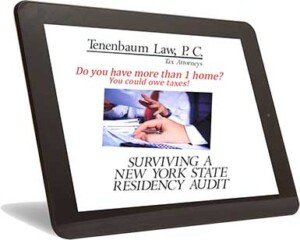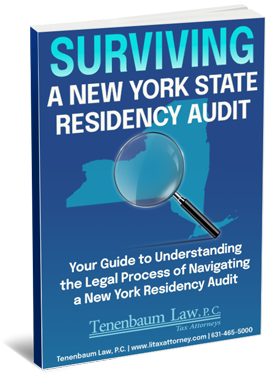Is your primary home outside New York State but you also own or use residential property in New York State?
You may be subject to a New York residency audit.
A New York residency audit is intended to establish whether a taxpayer accurately filed a New York personal income tax return as a nonresident, part-year resident, or resident.
New York State residents must pay New York State income tax on all income, regardless of where it is earned, while nonresidents pay tax to New York State on only New York State source income. Similar issues can arise with respect to New York City residents and they may also be subject to residency audits.
The New York Tax Law with respect to residency is complex and nuanced and depends on the particular facts and circumstances of each case. There are two separate and distinct ways of determining whether an individual is taxed as a resident or a nonresident:
(1) Domicile Test
A taxpayer will be treated as a resident if the person is domiciled in the State. The domicile test is based on several factors, and looks to determine where the taxpayer’s true home lies: What is the one place to which the taxpayer intends to return?
The burden of proof is on the party asserting a change in domicile. For example, if a taxpayer files as a NYS resident for several years, and then files as a nonresident, the burden of proof is on the taxpayer to demonstrate the domicile changed from NYS to somewhere else.
(2) Statutory Residency Test
Even if a taxpayer is deemed to be domiciled outside of New York, he or she may still be taxed as a New York resident under the Statutory Residency Test. Under this test, the taxpayer will be treated as a resident of New York if he or she:
- Maintains a “Permanent Place of Abode” in New York for substantially all of the year; AND
- Spends more than 183 days of the tax year in New York.
Whether a taxpayer “maintains a permanent place of abode” has been subject to many court decisions over the years, and the definition continues to evolve. The State considers several factors, including:
- Whether the abode is suitable for year-round use
- Whether the taxpayer has legal rights to the abode
- Whether the taxpayer has unfettered access to the abode
- Whether the taxpayer is using the abode’s address to register his or her car and receive mail
- Whether the abode had been maintained for more than 11 months during the year.
Regarding the 183-day rule, any part of a day spent in New York counts as a NY day, with some exceptions.
We represent taxpayers who are subject to NYS and NYC residency examinations. Feel free to contact us to discuss your NY residency audit. For additional background information on NY residency issues, download our FREE eBook on SURVIVING A NEW YORK STATE RESIDENCY AUDIT.





